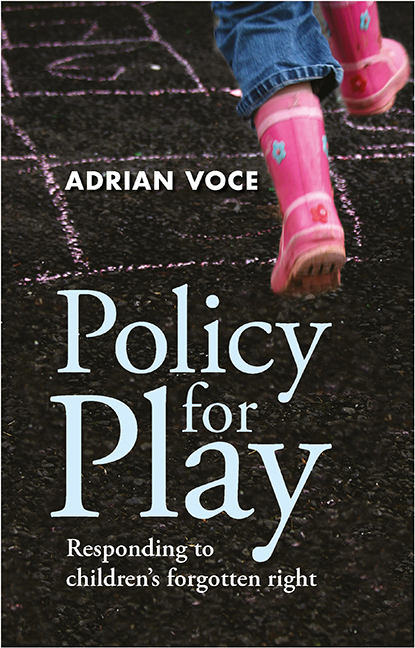Book contents
- Frontmatter
- Dedication
- Contents
- Who’s who
- About the author
- Preface
- Foreword
- Prologue
- Introduction ‘To respect, protect and fulfil’
- one ‘To play and to dream’ • Restoring play to the heart of the campaign for children’s rights
- two ‘For a change’ • Finding the evidence for play policy
- three ‘Advocates for play’ • Playwork’s place at the heart of the play movement
- four ‘New opportunities’ • Lottery funding and the beginnings of public play policy
- five ‘A vital and vibrant city’ • How devolved government in London set a benchmark for play policy
- six ‘Making the case’ • The call for a national play strategy
- seven ‘Things to do, places to go?’ • How play was overlooked by children’s services reform
- eight ‘Getting serious’ • The national play review
- nine ‘Lottery millions’ • The Children’s Play Initiative
- ten ‘Dirt is good’ • The Play England project
- eleven ‘The best place in the world’ • The Play Strategy for England
- twelve ‘Playbuilders’ • Breaking the mould of the public playground
- thirteen ‘Everyday adventures?’ • Austerity brings an end to play policy in England
- fourteen ‘Skylarks and canaries’ • The legacy of the Play Strategy
- fifteen ‘Children now’ • Responding to children’s right to play: conclusions and recommendations
- Epilogue
- References
- Index
thirteen - ‘Everyday adventures?’ • Austerity brings an end toplay policy in England
Published online by Cambridge University Press: 08 March 2022
- Frontmatter
- Dedication
- Contents
- Who’s who
- About the author
- Preface
- Foreword
- Prologue
- Introduction ‘To respect, protect and fulfil’
- one ‘To play and to dream’ • Restoring play to the heart of the campaign for children’s rights
- two ‘For a change’ • Finding the evidence for play policy
- three ‘Advocates for play’ • Playwork’s place at the heart of the play movement
- four ‘New opportunities’ • Lottery funding and the beginnings of public play policy
- five ‘A vital and vibrant city’ • How devolved government in London set a benchmark for play policy
- six ‘Making the case’ • The call for a national play strategy
- seven ‘Things to do, places to go?’ • How play was overlooked by children’s services reform
- eight ‘Getting serious’ • The national play review
- nine ‘Lottery millions’ • The Children’s Play Initiative
- ten ‘Dirt is good’ • The Play England project
- eleven ‘The best place in the world’ • The Play Strategy for England
- twelve ‘Playbuilders’ • Breaking the mould of the public playground
- thirteen ‘Everyday adventures?’ • Austerity brings an end to play policy in England
- fourteen ‘Skylarks and canaries’ • The legacy of the Play Strategy
- fifteen ‘Children now’ • Responding to children’s right to play: conclusions and recommendations
- Epilogue
- References
- Index
Summary
To anyone able to accurately read the political runes, the premature end of the Play Strategy after only two of its planned 12 years could have been foretold even before it was launched in 2008. However, contrary to appearances since 2010, the prospects for a serious Conservative government play policy, before the financial crash of 2007, had been surprisingly good.
On succeeding Tim Gill as director of the Children’s Play Council in 2004, I was granted a meeting with the Conservative Shadow Chancellor, Oliver Letwin, whose comments about us on Radio 4 had been so dismissive. After a slightly tense introduction, he eventually acknowledged that his characterisation of us was illinformed and promised he would do what he could to help sow the seeds for a more enlightened approach from his party, before cutting the meeting short to rush off and vote.
The Conservatives, in opposition, then had not had much to say about children’s play until a letter appeared in The Daily Telegraph in September 2006 (Abbs et al, 2006). Earlier that year, former head teacher Sue Palmer (2006) had published a book about what she termed the ‘epidemic of misery’ in the children of affluent developed nations. Palmer examined the big statistical increases in the numbers of children and young people with mental health, behavioural and eating disorders, and the rising levels of pupils classified as having additional needs in school. She suggested that these modern childhood ailments were the result of human evolution not being able to keep up with the pace of technological advances that had so changed the way that we live. Simply, modern life – including the radical reduction in children’s freedom to roam and to play – was, according to Palmer, making them unwell.
Over a hundred academics, writers and medical experts signed the Telegraph letter endorsing Sue Palmer’s diagnosis. It called for a closer examination of the quality of children’s lives, saying that they were increasingly tainted by overexposure to electronic entertainment, lack of play space and the emphasis on academic testing in schools. ‘[Children] still need what developing human beings have always needed’, it said, including ‘real (as opposed to junk) food, real play (as opposed to sedentary, screen-based entertainment), first-hand experience of the world they live in and regular interaction with the real-life significant adults in their lives’.
- Type
- Chapter
- Information
- Policy for PlayResponding to Children's Forgotten Right, pp. 125 - 136Publisher: Bristol University PressPrint publication year: 2015



